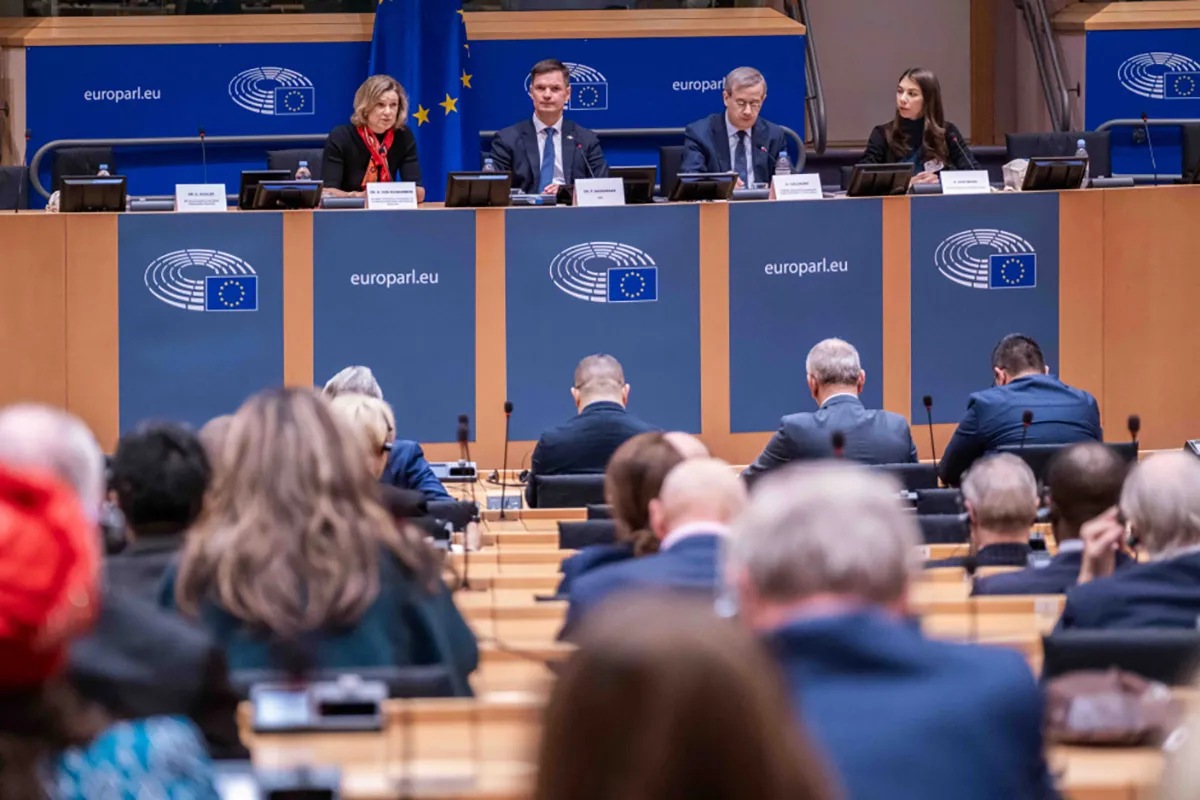
On the occasion of Human Rights Day 2024 we publish the press release of the Observatory on Intolerance and Discrimination Against Christians in Europe (OIDAC) and the press release of COMECE (The Catholic Church in the European Union). These are two reports of the round table, entitled ‘Safeguarding Religious Freedom in Europe: Current Challenges and Future Prospects’, organised by the European Parliament. In particular, COMECE councillor Alessandro Calcagno called for the creation of an EU coordinator to combat hate crimes against Christians, along the lines of similar initiatives to combat anti-Semitic and anti-Muslim hate crimes.
High-level panel debate in the EU Parliament calls for EU coordinator for combatting anti-chtistin hate crimes
In response to current trends of rising religious intolerance in Europe, religious freedom experts met at the European Parliament on December 4, 2024, to discuss the necessary steps and means to protect believers and safeguard religious freedom. The panel was chaired by MEP Dr Paulius Saudargas and consisted of religious freedom experts from different backgrounds: Dr. Katharina von Schnurbein, European Commission Coordinator for Combating Anti-Semitism and Promoting Jewish Life; Dr. Gudrun Kugler, Austrian Member of Parliament and Vice-President of the OSCE Parliamentary Assembly; Alessandro Calcagno, COMECE Adviser on Fundamental Rights and Article 17 TFEU; and Anja Hoffmann, Executive Director of OIDAC (Observatory on Intolerance and Discrimination against Christians in Europe), presented pressing issues and meaningful responses to current challenges in the area of religious intolerance and discrimination.

A moment of the round table
In his introductory remarks, MEP Saudargas welcomed the panel debate as an important step in the follow-up to the European Parliament's debate on rising religious intolerance in October. The panel discussion, entitled “Safeguarding Religious Freedom in Europe: Current Challenges and Future Prospects” followed this year's European Prayer Breakfast, held for the 27th time at the European Parliament and attended by some 450 guests from across Europe and beyond.
Dr Katharina von Schnurbein reminded the audience of the recent anti-Semitic attacks in Europe and how these should concern not only Jewish believers, but all of us. To overcome anti-religious hatred, von Schnurbein stressed the importance of working together across religious and ideological divides. “We should never underestimate the power of working together, even with those who do not agree on every point,” Schnurbein told the audience.
OIDAC Europe Director Anja Hoffmann presented the findings of the organisation's latest report on intolerance and discrimination against Christians in Europe. Alongside worrying trends of rising anti-Christian hate crimes in some European countries, such as the UK and Germany, Hoffmann also drew attention to legislation restricting religious freedom. Cases such as the five-year trial of Finnish MP Päivi Räsänen for tweeting a Bible verse, the prosecution of Maltese Christian Matthew Grech for telling his faith story on television, or the conviction of Adam Smith-Connor for praying silently in a so-called "buffer zone" near an abortion clinic in the UK, showed that lawmakers must carefully consider the side effects legislation can have on religious freedom.
COMECE Adviser Alessandro Calcagno underlined the need to respect all aspects of religious freedom, in its private and public, individual and collective dimensions, including religious autonomy rights. In this context, he underlined the need to overcome the misconception that the display of religious symbols may offend the sensibilities of believers of other faiths or non-believers. Calcagno also called for better protection of places of worship. In order to ensure that each religious community has equal access to protection tools, an EU Coordinator on combating anti-Christian hatred should be appointed, in parallel to the existing mandates for combating anti-Semitic and anti-Muslim hate crimes.
Asked by Mr. Saudargas whether she had ever felt discriminated against because of her beliefs, Dr Gudrun Kugler shared that as a politican she had expereicend discrimination because of her Christian faith. Dr Gudrun Kugler said that as a politician she had experienced discrimination because of her Christian faith. However, religious faith and adherence to sincerely held beliefs can also be a source of respect and help build bridges, even with those who do not share the same faith and values. Kugler also pointed out that there are a number of legal restrictions on religious freedom, including parental rights, across Europe. She mentioned regulations that forces medical students to participate in abortions in order to successfully complete their medical studies as a violation of conscience rights. “Human rights are not for picking and choosing,” stressed Kugler. “We have to make sure that all human rights are protected”. She expressed the hope that Europe will come to a mature understanding of religion and how best to accommodate religious beliefs.
Participants also stressed the need to extend the mandate of the Special Envoy for the promotion of freedom of religion or belief outside the EU.
Source: OIDAC Europe
COMECE at the European Parliament: “Time is mature for the appointment of an EU Coordinator on combating anti-Christian hatred”
COMECE (06.12.2024) — In the context of the 27th edition of the European Prayer Breakfast held at the European Parliament, in Brussels, on Wednesday, 4 December 2024, COMECE contributed to the conference on “Safeguarding Religious Freedom in Europe – Current challenges and future prospects”. COMECE: “The time is mature for the appointment of an EU Coordinator on combating anti-Christian hatred in Europe”.
Alessandro Calcagno, COMECE adviser for fundamental rights and Article 17 TFEU, outlined several EU Bishops’ priorities in the area of freedom of religion. Calcagno highlighted the need to ensure equal protection to all dimensions of this core fundamental right, including the institutional one, allowing Churches and religious communities to function normally and without having to face bias or undue obstacles-interferences.
“Too often, freedom of religion is depicted as a ‘problematic’ right, and its collective dimension, compared to its individual dimension, is neglected. Tolerance cannot become a surrogate for the protection of the fundamental right to freedom of religion”, stated Alessandro Calcagno.
On religious symbols, messages and expressions, adviser Calcagno underlined that “until they will be considered as potentially offensive to the sensibility of other believers or of non-believers, as well as a possible means of pressure on others, full protection of freedom of religion will not be ensured”.
The conference also gave the opportunity to COMECE to stress the importance of better mainstreaming the protection of freedom of religion across EU policies – e.g. protection of places of worship, data protection.
The COMECE representative also highlighted that the right to freedom of religion, as well as provisions to fight against discrimination on grounds of religion, should not be seen as primarily concerning religious minorities. “It is necessary to break the ‘majorities vs. minorities’ dynamic that underpins the approach of certain actors and policy-makers”, explained Alessandro Calcagno.
In this context, he called on behalf of COMECE for the appointment of an EU Coordinator on combating anti-Christian hatred. “We consider that the time is mature for this step, while not questioning the specificity of Jewish and Muslim communities, which are already covered by similar Coordinators. It is not a question of victimism, but equal access to tools of protection”, he said.
COMECE reiterated the positive role that religious literacy can play to promote and protect religious freedom and counter discrimination on grounds of religion. “This also applies to public authorities and institutions, so that they can craft well-grounded policies and legal measures”, continued Alessandro Calcagno.
At the end of the conference, COMECE emphasised that Article 17.3 of the Treaty on the Functioning of the European Union (TFEU), should be a tool to address concrete policy points as those discussed at the EP event, as opposed to general themes and principles.
The event was moderated by MEP Paulius Saudargas (Lithuania). It also featured high-level speakers like EU Coordinator on combating antisemitism and fostering Jewish life, Dr Katharina von Schnurbein, MP and Vice-President of the OSCE Parliamentary Assembly Dr. Gudrun Kugler and the Executive Director of The Observatory on Intolerance and Discrimination against Christians in Europe (OIDAC Europe) Ms Anja Hoffmann.
During the European Prayer Breakfast, the President of COMECE, H.E. Mgr. Mariano Crociata, offered a concluding prayer and blessed all participants.
Source: COMECE





